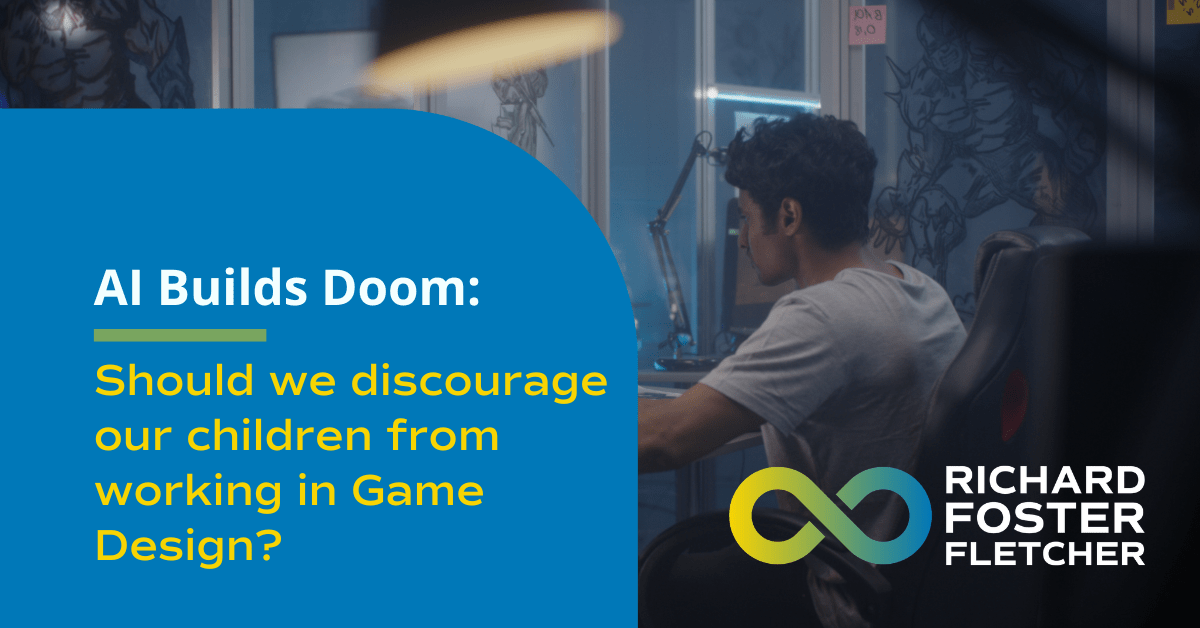
AI Builds Doom: Should We Discourage Our Children From Working in Game Design?

Recent discourse surrounding the future of coding and software development has been stirred by a leaked memo from Amazon. This document implied that the role of human coders might diminish significantly as artificial intelligence (AI) continues to evolve, raising critical questions about the sustainability of software development as a career. These concerns have gained traction as AI increasingly proves capable of performing tasks once considered the exclusive domain of skilled developers. A prime example of AI’s potential to reshape the field is Google’s recent innovation, where AI was used to simulate the classic game Doom without relying on a traditional game engine. This development forces us to reconsider the career advice we give to the next generation, particularly in the context of game design and development.
A New Era in Game Development
Google’s GameNGen represents a significant breakthrough: it is the first instance of AI fully simulating a complex video game without the assistance of a traditional game engine. This advancement suggests that the future of game development may be increasingly dominated by AI, not just as a tool for playing games, but as a creator of them. GameNGen utilises a neural network capable of generating real-time gameplay for Doom, simulating the intricate environments and interactions of the game without relying on manually coded game logic. This achievement, powered by a single Tensor Processing Unit (TPU), is a clear indication of AI’s growing efficiency and capability.
The implications are substantial. Traditional game engines demand extensive coding to manage game states, render visuals, and ensure fluid gameplay. These tasks, once the purview of skilled developers, could soon be managed more efficiently by AI. This shift could significantly reduce the time and cost associated with game development, potentially democratizing the field and allowing smaller studios or individual creators to produce high-quality, complex games.
Implications for Future Careers
These advancements prompt a crucial question: should we continue to encourage our children to pursue careers in video game design and development? Historically, this field has been seen as a promising avenue for those with a passion for technology and creativity. However, as AI progresses, the nature of these roles is likely to change.
If AI can autonomously generate entire game environments and simulate complex interactions, the demand for traditional coding skills in game development might decline. The focus may shift towards roles that involve guiding AI systems, setting creative direction, and ensuring that AI-generated content meets the desired standards. While this still requires significant human input, the skill set involved would differ considerably from traditional programming.
Moreover, AI’s potential to democratise game creation could lead to an influx of independently developed games. However, this could also result in a more saturated market, where the distinction between professional developers and hobbyists blurs. In such an environment, standing out may require more than just technical expertise; creativity, innovation, and the ability to leverage AI tools effectively could become the most valuable assets.
A Broader Perspective on AI and Employment
The concerns highlighted by the Amazon memo extend beyond game development. AI is poised to take over tasks in various industries that were once deemed too complex for machines. From software development to the creative industries, AI is emerging as a powerful tool that can augment or even replace human labour. This raises broader questions about the future of work and the skills that will be in demand.
In game development, while AI might reduce the need for traditional coding, it could also create new opportunities. AI-driven game engines, for instance, could lead to the development of new game genres, where environments, narratives, and gameplay mechanics dynamically evolve based on player actions. This could lead to more personalised gaming experiences and open up new avenues for storytelling and interaction.
Furthermore, the skills required to work effectively with AI—such as understanding machine learning models, data analysis, and AI ethics—are likely to become increasingly valuable. Encouraging the next generation to develop these skills could prepare them for a future where AI plays a central role across many industries, not just in game development.
The Role of Education and Guidance
Given these potential shifts, we must carefully consider how we guide the next generation in their career choices. While traditional coding skills will likely remain valuable, it is crucial to expand our understanding of what constitutes essential skills for future developers. Encouraging a deep understanding of AI, creativity, and the ability to think critically about the ethical implications of technology will be vital.
Educational systems need to adapt to these changes, ensuring that students are not only learning how to code but are also developing a broader understanding of technology’s role in society. This includes fostering creativity and innovation, which will remain critical even in a world where AI can manage many technical tasks.
Embracing Change While Nurturing Creativity
As we consider whether to encourage children to pursue careers in game design and development, it is essential to recognise that the field is on the cusp of significant change. AI has the potential to transform how games are created, potentially reducing the need for traditional coding skills while opening up new opportunities for creativity and innovation.
Rather than discouraging young people from entering the field, we should encourage them to embrace these changes. By developing a deep understanding of AI, nurturing their creativity, and preparing them to adapt to a rapidly evolving technological landscape, we can equip them with the skills needed to thrive in the future.
The role of human creativity in game design—and in many other fields—will remain crucial, even as AI takes on a more significant role. By guiding the next generation to harness the power of AI while maintaining their creative vision, we can ensure that they are well-prepared for whatever the future holds.
















